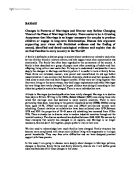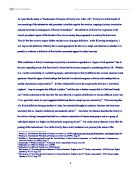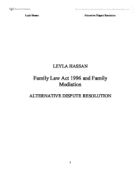The internet among other technological changes, has made the world smaller, and thus, the people who laws are made for and by, has a greater area on which to live. England has adapted to the globalisation of the society by implementing European law into the English law. Among other laws the Children Act 1989, which changed the social and legal status of the child in society.
The ever growing infrastructure of course plays a great role in making the world, especially Europe small. Taking cases to the European Human rights court in Strasbourg, France when living in the United Kingdom is a reality.
Another big change in society is the reproductive technology, which has both influenced but also been influenced by the social changes.
In 1987 the first “test tube baby” was born. Her name was Louise Brown and the method was IVF (in vitro fertilization technique) one of several methodologies.
This enabled childless heterosexual couples to conceive, but also opened up for homosexuals and single persons, to conceive likewise. The modified family.
Although it brought with it hope, the progress also brought controversy, and in order to properly protect the involved parties in the future, legislation was made on the area, the Human Fertilisation and Embryology Act 1990. The involved parties were the couple undergoing IVF treatment, the embryos a well as the NHS and the institutions in charge of further research.
A lot of consideration was put into the legal status of the embryo, which caused for an amendment in the Abortion Act 1967.
One of the challenges to legislation in an area like this, is that it makes it up to MPs and judges to decide on matters in which they have very little experience or professional knowledge. Even though they might offer good moral judgement, their actual insight is most likely quite limited in this area. Which is why The Human Fertilization and Embryology Authority was made, of 19 members of various backgrounds, to constantly monitor and license the research and treatment of Human Embryos. And furthermore to keep the public informed of any relevant changes in the area.
Another problem with legislation on a fast moving area of research, is that in the legislation, there must be definitions that aren’t subject to change or interpretation. In 2003 the act was amended, after two rather high profile cases regarding posthumous conception.Even though there was critique that there was a lack of legislative background prior to these cases.
In the years to come further change in society caused for further change in legislation. The HFEA 2008 dealt with the following changes;
Homosexual couples gained more recognition with the civil partnership act in 2004, and the concept of parenthood and family changed.
this resulted in an amendment allowing samesex couples to apply for treatment, and to be treated equally as parents, legal guardians.
And removes the previous requirement; “the child’s need for a father”.
With the progress now allowing for sex selection, this act restricts this for any other reason than medical reasons. And requires the clinics to take “the welfare of the child” into account when providing treatment.
There has been rapid change in this area, both technologically but certainly also legislative. It would be almost impossible for the law to have changed quicker than this within this field, without resulting in confusion.
The HFEA plays a role in building a bridge between research, society and law.
When it comes to the social changes, we have already been in contact with a few of them, because as stated above, the technological change is influenced by the social change and vice versa.
A social institution that has undergone a great deal of change, both socially and legally is the matrimonial institution.
Marriage was once the legal size by which families were linked, it provided a sense of security and belonging. It still does.
When registering a newborn, whether or not a woman is married, will have an affect on the birth certificate, unless measures have been taken to prove otherwise. Partners left behind after the death of their partner, might have been better protected legally had they been married. And who you are married to, or have been married to, affects who you can marry, as some in-laws will be “off limits”.
But the concept of marriage has changed, it is not as sturdy as it once was, it is not the condition for parenting, but it is still sought after by those who have been prohibited from it.
In Marriage Act 1949 it is stated that a marriage has to be between a man and a woman, which prohibits both homosexuals from getting married, but also transgendered people to marry one of the (original) same sex.
In 2004 the civil partnership act was entered, which gave the same legal status on a range of issues.
(This year however, by the Marriage Act (Same Sex Couples) 2013, homosexuals were finally allowed to marry, and thereby enjoy the legal security of the institution of marriage.)
(Both) These acts, are an answer to the change in society. The law has proven flexible to the social changes, and even though it may seem for some that it has been a long time coming, a part of adapting to societal change, is also making sure that there is enough to back up the law, so it won’t face too much resistance.
Even more hetero couples decide to live together in non conjugal unities, even taking the risks of being legally overseen in the event of the demise of their partner. And even though the government considered including hetero sexual couples in the civil partnership act, it was eventually dropped, as they already had a way of getting the protection of marriage.
This posed a problem for Anna Homsi, whose partner was killed in active service, she was left behind with his child to raise. But was not entitled to the war widows pension, because the couple were not married. The argument was that the couple could have married to secure those benefits, and that the army had a stated policy on the matter. However, it can be discussed whether the English Law should seek to make room for anyone, regarding of their attitudes towards marriage. Why should a couple who might not believe in the institution of marriage, be forced to enter into a such union, to secure benefits?
It could be argued that the law still needs to expand to fit the growing diversity of the people.
Another important development in the social behavior in regards to the matrimonial institution is the development of divorce.
Before 1857, divorce was only possible if the marriage was declared null, and it was only in exceptional cases that it was granted by the ecclesiastical courts. After that it became a secular matter with the Divorce and Matrimonial Causes Act 1857. And even then it was easier for a husband to divorce his wife than the other way around.
In 1923 , when women had also gotten the right to vote, a new Act was passed, that equalised adultery as a cause of divorce for both sexes.
In 1937, the causes for divorce was expanded by a new act, beyond adultery, to include incurable insanity, drunkenness, cruelty and desertion. Until after many years of debate on the matter, came no-fault divorces in 1973.
It has become more common, and less stigmatised. The traditional nuclear family has changed. The debates regarding divorced has been aimed at providing a dignified release from marriage, while reducing the harmful effects of divorce on children’s lives.
Children are becoming more visible in the legislation with the Children Act 1989.
Parenthood has become the key factor in family life.
With the changes in the family structure in England, and the adaption of the law to support it, in the light of the new technology as described above, it’s questionable why English Law continues to privilege biology above all else.
It could seem as if the legislative development has taken a step backwards in the light of new technology.
The Adoption of children Act 1926 recognises that families can exist successfully based on other ties than blood. And as stated earlier, the HFEA 2008 removes the requirement to take account of “a child’s need for a father” while recognising the IVF treated couple as parents.
Seen from the intention of these amendments there is an understanding of the alternative family, where the law supports it, and thereby protects the child.
However, in the attempt to lessen the financial burden of child maintenance from the state, the law seems to have higher regard for the financial support for the child, than it does for the emotional protection of a child whose father may not be interested, or -even though not covered in this module- suitable.
E.g. “Keith and Andrew”, where a man fathers a boy for 7 years and when he realises that he is not the biological father, relieves himself through legal action, of any parental responsibility. It is understandable that the man wishes for someone to be accountable for the lies, but the one being punished is the boy. It probably wouldn’t be hard to find biological fathers capable of the same thing after the break down of a relationship, but where biology prevents them.
The principle of law that protects the financial part, can be misused both ways.
The English law fails in this area to protect children from confusion by forcing biology even when not wanted.
Whether to criticize the Adoption act 1976 where children are allowed to trace their biological parents, is difficult, even though the intent here was to protect the children by giving them an opportunity to trace their birth parents. If this is in fact damaging or not, can be discussed, and most likely proven to both sides.
In the above several legal personalities have been described, and all of these has undergone changes throughout the years.
The law in England has sought to change in order to protect and support these legal personalities.
There are the rights and responsibilities of parents, or parent to be, of the medical staff and scientists handling the treatment of the potential parents, and the research of the technology, of donors and biological parents. The woman has changed from having no legal rights, to being a fully recognised legal personality. The same goes for homosexuals, whose lifestyle has been criminalised due to lack of knowledge, ad acceptance on the area.
Of these, the most important legal personality, is that of the child.
The children were more or less non-existing in the legislation prior to the Childrens act 1989, and now there is legislation determining the rights of an embryo. Or the duty for clinics to consider a possible embryos welfare once it becomes a child.
Taking both new legal personalities, new ethics and old values and lawmaking traditions into account.
There are areas though that are surprisingly haltering behind, such as the defence of reasonable punishment.
“Not all other countries seem to have the same problems with child abuse as Britain does...”
This could be an opportunity to respond to a much needed area of tragic development.
However, England has responded well to a number of social and technological changes, even though it is tempting to suspect that there has to be an overhanging financial incentive , in order to get the Law making machine rolling.
Word count: 2491
Websites:
Legislation:
Anti terrorism and security act 2001
The United Nations Convention on the RIghts of the Child 1989 (UNCRC)
The Human Fertilisation and Embryology Act 1990
The Human Fertilisation and Embryology Act 2003
The civil partnership Act 2004
The Human fertilisation and Embryology Act 2008
The Human Rights Act 1998
The Marriage Act 1949
The Marriage Act 2013
the Children Act 1989
The Adoption of Children Act 1926
The adoption Act 1976
The Divorce and Matrimonial Causes Act 1857
The Matrimonial Causes Act 1923
The Matrimonial Causes Act 1937
Caselaw:
Centre for reproductive Medicine v U (2002) EWCA Civ 565
R v Human Fertilisation and Embryology Authority, ex parte Blood (1997) 2 All ER 687








